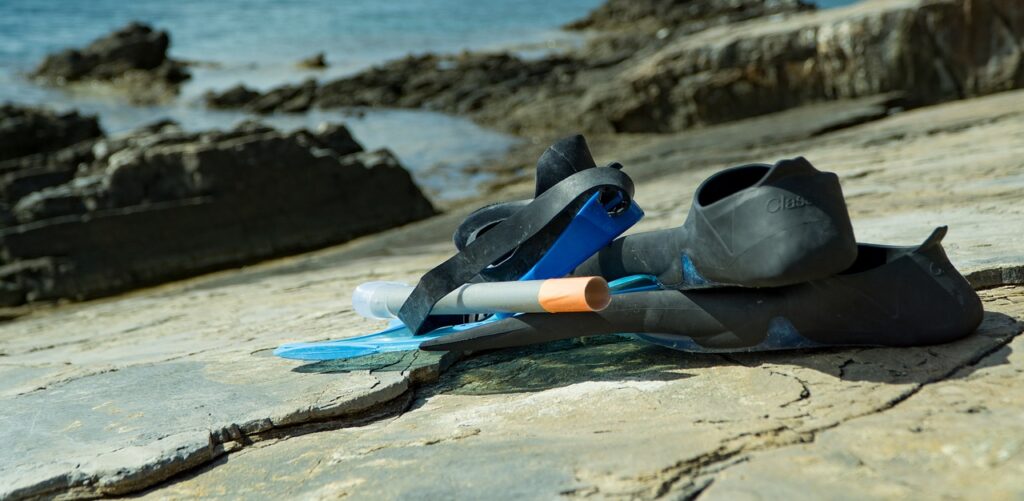

Freediving is a demanding sporting discipline in a potentially dangerous environment and can be hard work. Thorough training and practice of key exercises and techniques (e.g. equalizing ear pressure, apnea exercises) are essential for safety and performance and must not be rushed or skipped. Beginners can learn to freedive to depths of 10-15 meters within days or weeks.
While freediving techniques and apnea exercises can be self-taught, beginners may fare better when learning from an instructor who can also supervise their early dives. Overweight people can freedive if otherwise healthy, although overweight could be a disadvantage in elite competition.
Freediving can be very safe when freedivers are trained, experienced and following safety guidelines. Beginners should also pay attention to their diving environment, keep the length and depth of dives within the limits of their competence, and always dive with a buddy who can provide assistance or raise the alarm if there’s any incident in the water.
Freediving can be hard work. It is a challenging but rewarding sporting discipline which requires systematic training and preparation to stay safe and perform at a high level. Body and mind both come under high pressure during freediving and it is important that divers have mastered key techniques including ear pressure equalization and breath-holding (apnea).
The True Story Book of Freediving Champion Audrey Mestre and the Story of Her Death
View on Amazon: The Last Attempt (Opens new tab)


Top rated read
If you’ve ever watched a film or read a book about freediving, you may be wondering whether it’s hard. Our article tells you more about how long it takes to learn freediving and some of the risks and challenges you might encounter on the way.
How long does it take to learn freediving?
Freediving places unusual stresses on the whole body and mind, especially the cardiopulmonary system. It requires you to learn physiology and safety principles, become competent in breathing and breath-holding exercises, and master static and dynamic apnea techniques along with mental resilience. These processes should not be rushed or skipped.
With focus and good instruction, you could be taking shallow breath-hold dives within hours and diving to depths of 10-15 meters after a course of only a few days or weeks. Becoming a competitive freediver or diving to greater depths could take many months or years.
When building up breath-holding capability, strength and mental resilience under apnea conditions, there is no quick substitute for a broad but focused program of apnea exercises, strength training and cardio work, along with lots of freediving practice in the water.
Can you teach yourself to free dive?
The core principles and techniques of freediving can be self-taught from books or online materials, but it is extremely unsafe to freedive alone. As a beginner, it may be safest to freedive with an experienced instructor. At the least, you should freedive with a more experienced buddy. A blackout or other incident in the water could easily prove fatal if diving alone.
For much more information and advice, check out our full article on whether you can teach yourself to freedive (opens new tab).
Is freediving dangerous?
Freediving takes place in a high pressure underwater environment, where hazards include rising hydrostatic pressure, low blood oxygen (hypoxia) and high blood carbon dioxide (hypercapnia). As dives become deeper, freedivers run increased risk of developing conditions including decompression sickness (DCS, or “the bends”), nitrogen narcosis and barotrauma to ears or lungs.
Freediving can be very safe when divers are well-trained, have the right support on hand, and take safety precautions seriously. Since the institution of competitive freediving, there has only been a single recorded death (Nicholis Mevoli) during over 80,000 competitive freedives around the world.
There is a higher rate of accidents and deaths in recreational free diving, which could be around 51 freediving deaths annually according to analysis of voluntary and media accident reports collected by the Diver’s Alert Network (DAN) between 2004-2017.
Competitive freediving may be less dangerous because dives are managed and monitored under strict competition guidelines, specialized doctors are present, and all participants are fully trained and highly experienced professionals.
Recreational freediving may be more dangerous because participants could have less training and experience, and could be diving in less controlled water conditions, without the same expert medical supervision and safety assistance. Freedivers who choose to dive alone without a diving buddy run even higher risks.
Can overweight people freedive?
You can still freedive recreationally if you’re overweight as long as you are otherwise in good health with no heart, lung or other relevant medical conditions. Freediving is a demanding form of exercise with both aerobic and anaerobic elements, which can help you get fitter and stronger, while burning excess body fat.
It is unlikely that elite divers in competitive freediving would be overweight given the physical demands of their sport and their regular exercises and diving practice. When competing at higher levels, excess weight could be a negative influence on performance. (More body fat could increase a diver’s buoyancy and force them to work harder during a dive.)
References
https://gue.com/blog/is-freediving-safe/
https://dan.org/research-reports/research-studies/surveillance-of-fatal-injuries-in-diving/
